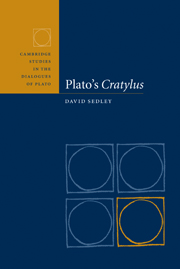Chapter 4 - Etymology at work
Published online by Cambridge University Press: 22 September 2009
Summary
TRADITION AND INNOVATION
We now move from Part I to Part II of the dialogue. At 390d11–e5, Socrates and Hermogenes agree on the following proposition:
Cratylus is right to say that things have their names by nature, and that not everyone is a craftsman of names, but only one who looks to the name that belongs by nature to each thing and is able to put its Form in letters and syllables.
Hermogenes is not resistant, but needs this newly emerging principle of the correctness of names to be explained and illustrated to him. Socrates, reasserting his own ignorance of the topic, refuses the requested explanation, but offers in its place a joint investigation of the matter. This disavowal of knowledge is, not untypically of Plato's Socrates, partly ironic. In the event he will not just pour forth a veritable flood of illustrations, but will make it clear, by rejecting etymologies he disagrees with, that he is not entirely ignorant of the practice of etymology. Indeed, he will pretend to have been inspired by Euthyphro whom he says he heard – presumably etymologising – earlier this very morning, even though none of the actual etymologies he will propose or consider is attributed to Euthyphro. In fact the question of his familiarity or unfamiliarity with existing etymological practice is kept teasingly unsettled throughout.
- Type
- Chapter
- Information
- Plato's Cratylus , pp. 75 - 98Publisher: Cambridge University PressPrint publication year: 2003



